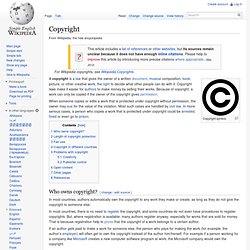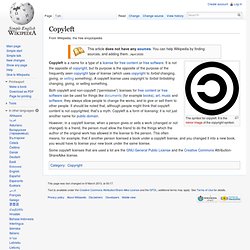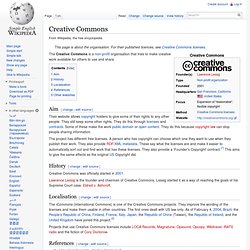

Copyright. Copyright symbol.

A copyright is a law that gives the owner of a written document, musical composition, book, picture, or other creative work, the right to decide what other people can do with it. Copyright laws make it easier for authors to make money by selling their works. Because of copyright, a work can only be copied if the owner of the copyright gives permission. When someone copies or edits a work that is protected under copyright without permission, the owner may sue for the value of the violation. Most such cases are handled by civil law. Who owns copyright? In most countries, authors automatically own the copyright to any work they make or create, as long as they do not give the copyright to someone else.
In most countries, there is no need to register the copyright, and some countries do not even have procedures to register copyrights. Length of copyright protection[change | edit source] Fair use[change | edit source] Copyright in different countries[change | edit source] Patent. Copyleft. The symbol for copyleft.

It is the mirror image of the copyright symbol. Copyleft is a name for a type of a license for free content or free software. It is not the opposite of copyright, but its purpose is the opposite of the purpose of the frequently seen copyright type of license (which uses copyright to forbid changing, giving, or selling something). A copyleft license uses copyright to forbid forbidding changing, giving, or selling something. Both copyleft and non-copyleft (“permissive”) licenses for free content or free software can be used for things like documents (for example books), art, music and software; they always allow people to change the works, and to give or sell them to other people. However, in a copyleft license, when a person gives or sells a work (changed or not changed) to a friend, the person must allow the friend to do the things which the author of the original work has allowed in the license to the person. Creative Commons. The Creative Commons is a non-profit organisation that tries to make creative work available for others to use and share.

Aim[change | edit source] Their website allows copyright holders to give some of their rights to any other people. They still keep some other rights. They do this through licenses and contracts. Some of these make the work public domain or open content. The project has different free licenses. History[change | edit source] Creative Commons was officially started in 2001. Lawrence Lessig is the founder and chairman of Creative Commons. Localisation[change | edit source] The iCommons (International Commons) is one of the Creative Commons projects. Projects that use Creative Commons licenses include LOCA Records, Magnatune, Opsound, Opcopy, Wikitravel, iRATE radio and the fiction of Cory Doctorow. References[change | edit source] Other websites[change | edit source] Creative Commons Video.
Intellectual property. Intellectual property (IP) rights are the legally recognized exclusive rights to creations of the mind.[1] Under intellectual property law, owners are granted certain exclusive rights to a variety of intangible assets, such as musical, literary, and artistic works; discoveries and inventions; and words, phrases, symbols, and designs. Common types of intellectual property rights include copyright, trademarks, patents, industrial design rights, trade dress, and in some jurisdictions trade secrets. Although many of the legal principles governing intellectual property rights have evolved over centuries, it was not until the 19th century that the term intellectual property began to be used, and not until the late 20th century that it became commonplace in the majority of the world.[2] The British Statute of Anne (1710) and the Statute of Monopolies (1624) are now seen as the origins of copyright and patent law respectively.[3] History[edit] Types[edit] Patents[edit] Copyright[edit] Morality[edit]
Merriam-Webster's Learner's Dictionary. Interpreting a Dictionary Entry. Merriam-Webster's Learner's Dictionary. Revised "Sinde" anti-piracy law passed by Senate.